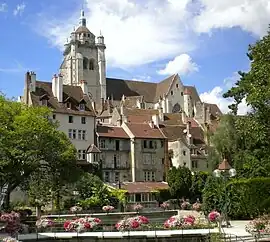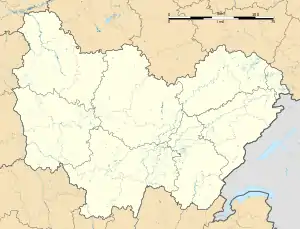Dole, Jura
Dole (French: [dɔl],[3] sometimes pronounced [dol])[4] is a commune in the Jura département, of which it is a subprefecture (sous-préfecture), in the Bourgogne-Franche-Comté region, in Eastern France. In 2019, it had a population of 23,711.[5]
Dole | |
|---|---|
Subprefecture and commune | |
 Old Dole | |
.svg.png.webp) Coat of arms | |
Location of Dole | |
 Dole  Dole | |
| Coordinates: 47°05′35″N 5°29′26″E | |
| Country | France |
| Region | Bourgogne-Franche-Comté |
| Department | Jura |
| Arrondissement | Dole |
| Canton | Dole-1 and 2 |
| Intercommunality | CA Grand Dole |
| Government | |
| • Mayor (2020–2026) | Jean-Baptiste Gagnoux[1] |
| Area 1 | 38.38 km2 (14.82 sq mi) |
| Population | 23,611 |
| • Density | 620/km2 (1,600/sq mi) |
| Time zone | UTC+01:00 (CET) |
| • Summer (DST) | UTC+02:00 (CEST) |
| INSEE/Postal code | 39198 /39100 |
| Elevation | 196–341 m (643–1,119 ft) |
| Website | www |
| 1 French Land Register data, which excludes lakes, ponds, glaciers > 1 km2 (0.386 sq mi or 247 acres) and river estuaries. | |
History
Dole was the capital of Franche-Comté until Louis XIV conquered the region; he shifted the parlement from Dole to Besançon. The university, founded by Duke Philippe le Bon of Burgundy in 1422, was also transferred to Besançon at that time.
In January 1573, Gilles Garnier was put to death after being found guilty of lycanthropy and witchcraft. He had confessed to murdering and cannibalizing at least six children. The 1995 film Happiness Is in the Field was set in Dole and The Widow Couderc was also partially filmed there.
Geography
Dole is located on the river Doubs. The commune has a land area of 38.38 km2 (14.82 sq mi).
Demographics
|
| ||||||||||||||||||||||||||||||||||||||||||||||||||||||||||||||||||||||||||||||||||||||||||||||||||||||||||||||||||
| Source: EHESS[6] and INSEE (1968-2017)[7] | |||||||||||||||||||||||||||||||||||||||||||||||||||||||||||||||||||||||||||||||||||||||||||||||||||||||||||||||||||
It is the largest commune in Jura, although the préfecture is Lons-le-Saunier.
Transport
Dole-Ville station has rail connections to Dijon, Paris, Lausanne and Besançon. Dole – Jura Airport is located in the commune of Tavaux, 7 km southwest of Dole.
Famous residents
- Suzanne Douvillier (1778 – 1826), pioneer dancer and choreographer.
- Simon Bernard (28 April 1779 – 5 November 1839)- Napoleonic aide de camp and notable engineer in the United States.
- Marie Émile Antoine Béthouart (17 December 1889 – 17 October 1982), soldier.
- Louis Pasteur (27 December 1822 – 28 September 1895), microbiologist and chemist
- Jacques Duhamel (1924 - 1977), mayor of Dole from 1968 to 1976
- Michel Chapuis (15 January 1930 – 12 November 2017), organist
- Hubert-Félix Thiéfaine (21 July 1948 − ), pop-rock singer and songwriter, born in Dole
Museums
The Museum of Fine Arts, Dole founded in 1821, is located in the House of the Officers, an example of military architecture of Franche-Comté at the 18th century.
Twin towns and sister cities
Dole is twinned with:
References
- "Répertoire national des élus: les maires" (in French). data.gouv.fr, Plateforme ouverte des données publiques françaises. 13 September 2022.
- "Populations légales 2020". The National Institute of Statistics and Economic Studies. 29 December 2022.
- (in French) Henri Bertand in the video Henri Bertand se livre Archived February 6, 2009, at the Wayback Machine, tvdole.com
- (in French) Francis Guthleben in Imagine ce pays - Dôle, France 3 Bourgogne-Franche Comté
- INSEE commune file
- Des villages de Cassini aux communes d'aujourd'hui: Commune data sheet Dole, EHESS (in French).
- Population en historique depuis 1968, INSEE